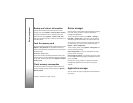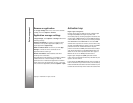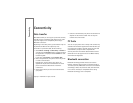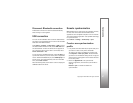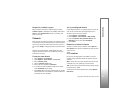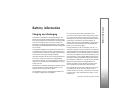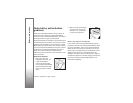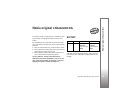
Connectivity
88
Copyright © 2007 Nokia. All rights reserved.
Remote database—the name of the used remote
database
Synchronisation type—Select Both ways for
synchronization of the data on your phone and the
remote database, To phone only for the
synchronization of the data on your phone only, or To
server only for the synchronization of the data on the
remote database only.
3 Define the Connection settings :
Server version, Server ID, Data bearer, Host address,
Port, User name, and Password—Contact your service
provider or system administrator for the correct
settings.
Access point—Only visible if Internet is selected as
Data bearer. Select an access point you want to use
for the data connection.
Allow sync requests > Yes—to allow that the server
starts the synchronization
Accept all sync requests > No—to require a
confirmation before the server starts the
synchronization
Network authentication—Only visible if Internet is
selected as Data bearer. To use HTTPS authentication,
select Yes, and enter user name and password in
Network user name and Network password.
Synchronize data
In the main view, scroll to a profile, and select Options >
Synchronise. The status of the synchronization is shown.
After synchronization is complete, select Options > View
log to open a log file showing the synchronization status
(Complete or Incomplete) and how many calendar or
contact entries have been added, updated, deleted, or
discarded (not synchronized) in the phone or on the server.
Push to talk
Push to talk (PTT) (network service) is a real-time voice
over IP service (network service) available over a GSM/
GPRS network. PTT provides direct voice communication
connected with a single keypress.
Before you can use the PTT service, you must define the PTT
access point and PTT settings.
In PTT communication, one person talks while the others
listen. Speakers take turns responding to each other. Only
one group member can talk at a time. The length of time
of each turn is limited.
Phone calls always take priority over PTT calls.



